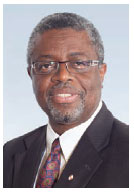 |
 |
 |
|
May 2014
|
This is what the new Diplomatic Academy of the Caribbean is all about. Unlike other diplomatic academies, the Diplomatic Academy of the Caribbean, launched on May 6, 2014 at the new Conference Centre of the St. Augustine campus of The UWI, was envisioned as a training facility for a new form of diplomacy that would be relevant to the changed condition of the 21st Century. But the proposal for such a training facility had to take into consideration global changes as we entered this century. Clearly, in an era of globalization, complex interdependence, and momentous global change, diplomats have to constantly update their knowledge, skills and aptitudes to be effective in the practice of contemporary international relations and diplomacy. The traditional model of diplomacy, as an element of statecraft reserved for an elite group who develops a country’s foreign policy almost entirely in secret, is long over. Diplomacy is no longer the sole preserve of foreign ministries. It is being undertaken by many government ministries, as well as by private sector individuals and others within civil society. This has made the environment within which diplomats operate a lot more complex. In addition, the advent of instant media, social media, Wikileaks, and various advancements in information technology has meant that the club model of diplomacy, which pretends to be hermetically sealed from exogenous and endogenous influences, is basically a dying breed. The new diplomat is a public diplomat. New diplomats must engage with domestic and external societies, in an intermestic environment, and they must learn the modern tools of communication that facilitate the multiplication of their government’s foreign policy message abroad. Thus the modern diplomat must be as comfortable with texting, Twitter, Tumblr, Facebook, YouTube, Flickr, Linked-in, Blogs, RSS feeds, Internet crowd-sourcing, etc, as much as earlier counterparts might have been with the diplomatic pouch, cables and Telexes. Modern diplomacy is network diplomacy and this has replaced the old club diplomacy. So when the Diplomatic Academy of the Caribbean was being conceived by a steering committee consisting of officials from the Ministry of Foreign Affairs and The UWI, we chose to establish a training facility that would begin from the premise of a changing, increasingly complex and turbulent environment within which diplomats have to operate. We also decided that the professional diplomatic training would be done via short, highly intensive, hands-on modules to accommodate individuals who are already in full-time positions and who may not be able to get an entire semester off to take courses. We devised modules that would address the multiple issues which the modern diplomat has to face: protocol; public diplomacy; bilateral diplomacy; multilateral diplomacy; conference diplomacy; commission diplomacy; summit diplomacy; cultural diplomacy; digital diplomacy; economic and trade negotiations; mediation, crisis and conflict management; humanitarian and human rights diplomacy; international law; security intelligence and defence diplomacy; health diplomacy; food security diplomacy; climate change diplomacy; disaster management and risk reduction; and dealing with rising powers like China, Brazil, India, and South Africa. The Diplomatic Academy of the Caribbean became a reality when it was launched as a joint effort between the Ministry of Foreign Affairs and the Institute of International Relations, The UWI. The training modules began the very next day with a module on Contemporary Diplomacy led by the gurus of Public Diplomacy: Ambassador Jorge Heine and Professor Andrew Cooper. Certificates were awarded at a presentation ceremony on May 13. Participants will be coming from all across the Caribbean, and perhaps even outside; from non-sovereign territories like Martinique, Guadeloupe, Puerto Rica and Aruba; from several line ministries, such as foreign affairs, trade, tourism, planning, gender, defence, and the Attorney General’s office; and from private sector companies, educational institutions and Non-Governmental Organizations. We are soliciting the help of all Caribbean governments, as well as regional and sub-regional organizations like CARICOM, the OECS, the ACS, CELAC, ECL AC, and the OAS, to help us spread the word about this new and innovative diplomatic academy. In addition, our Academy will form links with other similar and significant academies in Argentina, Australia, Brazil, Costa Rica, Chile, Germany, Malta, Spain, and South Korea. Our aim is to produce leaders in diplomacy who are able to help our small states punch above their weight in every arena.
Professor Andy Knight is Director of the Institute of International Relations at the St. Augustine campus of The UWI. |


 There is a saying that “diplomacy is the art of letting others have your own way.” Diplomacy is certainly an ancient art that operated along that premise. In one sense, the essence of diplomatic practice has never really disappeared. But in another, the art of diplomacy has had to adapt to changing conditions.
There is a saying that “diplomacy is the art of letting others have your own way.” Diplomacy is certainly an ancient art that operated along that premise. In one sense, the essence of diplomatic practice has never really disappeared. But in another, the art of diplomacy has had to adapt to changing conditions.